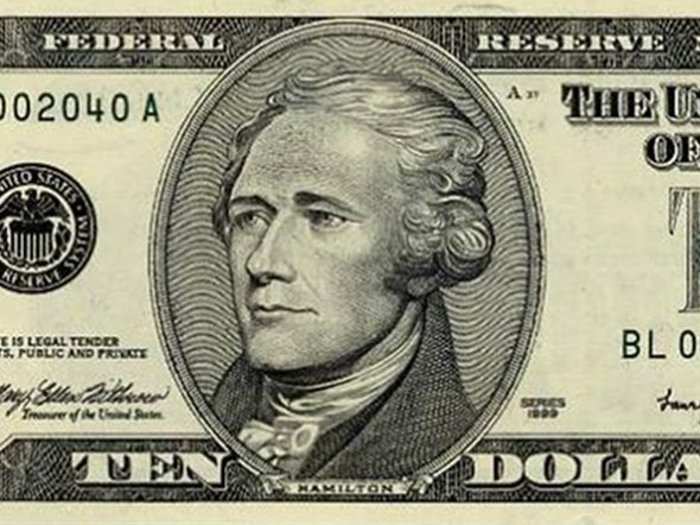
In 1791, Washington was undecided about a central bank and asked Hamilton for advice after Thomas Jefferson and Attorney General Edmund Randolph advised against it.
Hamilton wrote nearly 15,000 words in what was evidently a successful rebuttal; Washington signed the bill, which provided a 20-year charter for the First National Bank.
Source: Federal Reserve of Philadelphia

He is often accused of acting in the Rothschilds' interests by facilitating the creation of a central bank. The following quote is commonly used in online postings to connect Hamilton to Rothschild:
Alexander Hamilton married into the Rothschild family December 14, 1780, Alexander Hamilton was born Alexander Levine, of Jewish lineage, in St. Croix, the West Indies. After changing his name and his geographical situs, he married Elizabeth Schuyler… [The Intimate Life of Alexander Hamilton, by Allan Hamilton 1910]
Source: The Robot's Rebellion

Check it out here for yourself -- the book in question does not even mention the Rothschilds. Other 'fringe' books like No More Taxes by John Paul Mitchell insist that Hamilton married into the Rothschild family.
Here's what we actually know about Hamilton's in-laws: the father, Philip Schuyler, was a General during the Revolutionary War, while the mother Catherine instituted a scorched earth policy to deprive the British of food.

Dr. Thayer Watkins of San Jose State University claims that 70 percent of the central bank was owned by foreigners, and notes that Britain was the primary source of capital for the U.S during this era.
Given that the U.S. relied on British capital, and British banks were dominated by the Rothschilds, it's safe to say the family had a substantial stake in the First National Bank.
Source: San Jose State University

Thomas Jefferson and Andrew Jackson were vociferously opposed to a central bank, and believed the American people (through Congress), not private or foreign interests, should dictate the supply of money.
Source: Vers Demain Journal

Upset at losing this profitable monopolistic venture, Nathan is said to have furiously declared, “Either the application for the renewal of the charter is granted, or the United States will find itself involved in a most disastrous war.”
He then 'instructed' the British to “Teach these impudent Americans a lesson. Bring them back to Colonial status.”
These quotes have not been verified, and serve as the basis of the Rothschild 1812 conspiracy thesis.
Source: Vers Demain Journal

This ignores several legitimate causes of the war, such as:

Moses Taylor, another alleged Rothschild agent, founded the National City Bank of New York in 1812, which conspiracy theorists claim is an extension of the Rothschild banking conglomerate.
National City Bank would later become Citibank.
Source: Vers Demain Journal

As explained in this excerpt from Reginald Horsman's The Causes of the War of 1812:
Some restrictions on neutral commerce were essential for England in this period. That this restriction took such an extreme form after 1807 stemmed not only from the effort to defeat Napoleon, but also from the undoubted jealousy of America's commercial prosperity that existed in England. America was unfortunate in that for most of the period from 1803 to 1812 political power in England was held by a group that was pledged not only to the defeat of France, but also to a rigid maintenance of Britain's commercial supremacy.

The Bureau of the Public Debt reports "Total public debt increased from $45.2 million on January 1, 1812, to $119.2 million as of September 30, 1815."
Source: Bureau of the Public Debt

The Philadelphia Fed reports:
"In effect, the country found itself in circumstances similar to those after the Revolutionary War: mounting debt from a war with England, soaring prices, and devalued money from rising inflation."
As such, President James Madison authorized the creation of the Second Bank of the United States.
Source: Federal Reserve of Philadelphia

Foreign holdings of the Second Bank of the United States grew from just under 30,000 shares in 1820 to over 84,000 shares in 1832. James de Rothschild of France was rumored to be a principal investor in the new central bank.
Source: The Second Bank of the United States, Vers Demain Journal

The Rothschild 1812 theory is flawed from the start from its assumption that Alexander Hamilton acted as an agent of the family – which would presumably be for his personal gain – because Hamilton died destitute.
The Rothschilds would go on to perfect the strategy of lending to countries on each side of a conflict over the following century of chronic warfare.
Source: Business Insider

 Tesla tells some laid-off employees their separation agreements are canceled and new ones are on the way
Tesla tells some laid-off employees their separation agreements are canceled and new ones are on the way Taylor Swift's 'The Tortured Poets Department' is the messiest, horniest, and funniest album she's ever made
Taylor Swift's 'The Tortured Poets Department' is the messiest, horniest, and funniest album she's ever made One of the world's only 5-star airlines seems to be considering asking business-class passengers to bring their own cutlery
One of the world's only 5-star airlines seems to be considering asking business-class passengers to bring their own cutlery 9 Foods that can help you add more protein to your diet
9 Foods that can help you add more protein to your diet
 The Future of Gaming Technology
The Future of Gaming Technology
 Stock markets stage strong rebound after 4 days of slump; Sensex rallies 599 pts
Stock markets stage strong rebound after 4 days of slump; Sensex rallies 599 pts

Copyright © 2024. Times Internet Limited. All rights reserved.For reprint rights. Times Syndication Service.